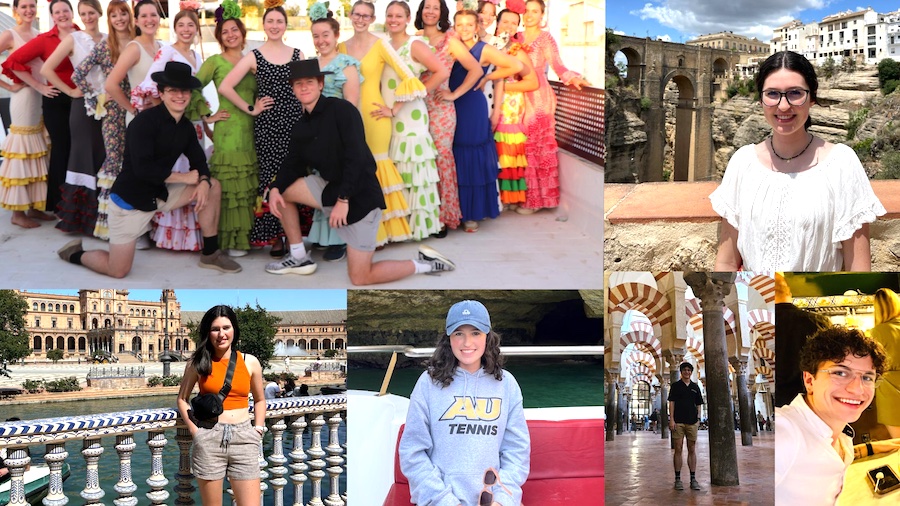Two Anderson University students traveled to Spain where they were immersed in one of Europe’s greatest cradles of culture while studying aspects of the country’s healthcare system.
For them it was also a chance to become immersed in the Spanish culture while staying with host families in their homes.
“Something that I really loved is honestly just getting to interact with people and in Spanish and just getting to experience what feels almost like another world, because everything is so different with a new language, new culture, new food—it just kind of feels like a fresh start,” said Caleb Hunnicut, a Kinesiology major. “It’s so different.”
Hunnicut’s studies were funded by the U.S. Department of State’s Benjamin A. Gilman Scholarship program and the help of the Anderson University Center for Global Engagement to make the trip a reality.
Also in Spain was Ariana Daduica, a Biology major with a Spanish minor. Daduica’s mother worked for Delta Airlines, so she is no stranger to international travel, and though she traveled to Spain at around the age of eight, this is her first visit to Seville.
Experiencing another culture wasn’t without its adjustments for Daduica and Hunnicut. Probably their biggest adjustment was a daily routine where everyone takes a break for a siesta—a time of rest, then resuming their activities into the evening, capping off the day with dinner around 10 p.m.
Both have been taking “Healthcare in Spain,” a class where they become familiar with the country’s healthcare system, learning about medical terminology and communicating with patients. Hunnicut also had a practical internship working with neurodivergent children and doing physical therapy related activity with them at camps he was involved in.
“I’m excited just to be able to do what I love, physical therapy wise, but also in Spanish helping people who need that help,” Hunnicut said.
Daduica, who wants to become a physician assistant, said, “We were learning different medical terms. We also learned a little bit about the Spanish healthcare system and how to speak to patients in Spanish, and what grammar you should be using. Another class was about modern topics in Spain, so this wasn’t as rigorous as the other one; we learned about political feminism and the government, like the monarchy.”
Daduica appreciates not only learning more about healthcare in Spain but also immersing herself in the culture and traveling to historical sites in and near Seville.
Of the sights Daduica has seen, she has her favorites.
“Definitely the Real Alcazar and the cathedral in Seville. All the gardens and parks around the Plaza de España—they’re really beautiful,” Daduica said. “We’ve done a few weekend trips. Our first one, we went for a day to Cadiz, and we went to the beach and then we walked around the city. We did a long weekend in Portugal in Albufeira. We did a boat tour of some of the most beautiful caves in the world.”
Hunnicut enjoyed visiting a large cathedral in Cordoba and observing the melding of Christian and Muslim cultures in southern Spain.
“There are a lot of places you can visit that still have all of the different designs of Arabic influence. It’s pretty interesting to go into a cathedral but then still see a lot of the intricate design and artwork from all you typically see in a mosque,” Hunnicut said.
To their delight, Krissie Butler, associate professor of Spanish and chair of the Department of Modern Languages and Cultures, was traveling in Spain and met up with them.
At the end of her course in Spain, Daduica then traveled to Romania to spend a month with family members there and volunteer at a Romanian hospital. “My parents are originally from Romania. I speak Romanian,” Daduica said.
Daduica and Hunnicut were joined in Spain by many students from various Christian institutions for the Semester in Spain program.
This summer, Anderson University students have pursued study abroad programs in Australia, Chile, Costa Rica, Italy, Spain and the United Kingdom (London and St. Andrews, Scotland).
The Anderson University Center for Global Engagement directs short-term programs, mission trips, faculty-led experiential learning programs and semester-long programs. Anderson University has cooperative agreements so students can take part in semester-long programs in such countries as: Argentina, Australia, Canada, Chile, Costa Rica, Croatia, Czech Republic, England, France, Germany, Greece, Ireland, Italy, Lithuania, New Zealand, Scotland, South Africa, South Korea, Spain, the Netherlands and Uganda.
For more information, contact the Center for Global Engagement at studyabroad@andersonuniversity.edu or (864) 231-2141.

